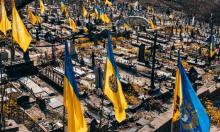Disputes over ex-Soviet turf likely to sour over Putin-Bush talks this week
When Russian President Vladimir Putin visits U.S. President George W. Bush in Washington on Friday, disputes over post-Soviet turf are likely to be the sour counterpoint to any talk of cooperation a reflection of the cold spell that has replaced one-time high hopes for the relationship.
Four years ago, Putin helped turn a new page in U.S.-Russian relations by offering steadfast support to the United States after the Sept. 11 terror attacks and welcoming the American military deployment in ex-Soviet republics of Central Asia to support military action in Afghanistan.
But the initial euphoria about a new Russian-U.S. partnership soon gave way to disputes over the U.S. war in Iraq, Putin's authoritarian streak at home and his government's muscling of other ex-Soviet republics.
Russia, which sought to cast its war in Chechnya as part of the global fight against terror, bristled at U.S. contacts with Chechen rebel envoys as a reflection of American "double standards."
Bilateral ties were badly bruised last year by a dispute over Ukraine, where pro-Western Viktor Yushchenko rode a wave of public protest to win the presidency in a battle against a Moscow-backed rival.
Ukraine's Orange Revolution and similar protests that ousted unpopular regimes in Georgia and Kyrgyzstan fueled the Kremlin's fears that other former Soviet republics could be drawn into the Western orbit.
"Russia believes that the United States is trying to establish its control over ex-Soviet republics," said Sergei Markov, a political analyst with links to the Kremlin. "Russia's efforts to defend its interests in the post-Soviet space have irritated the United States, but Putin isn't going to forget about the national interests just to please American public opinion."
A Kremlin official who spoke on condition of anonymity because of the subject's sensitivity said Wednesday that the situation in the ex-Soviet region would be "one of the most difficult issues" in Friday's talks, reports the AP.
Subscribe to Pravda.Ru Telegram channel, Facebook, RSS!




